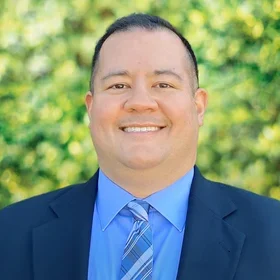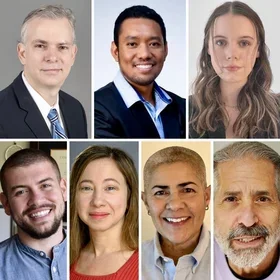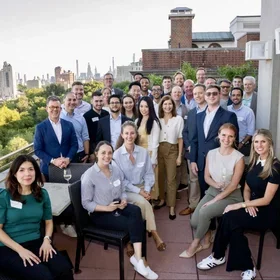When asked about his background, M.S. in Nonprofit Management program alum Jan-Paul Roodbol (’24SPS) first sped through the basics. He is from South Africa, came to the United States 20 years ago, and has a Bachelor of Science in Mathematical Statistics and a Master of Business Administration from the University of Stellenbosch. He had a career primarily in finance, including global financial projects and risk management, and has had multiple nonprofit leadership roles, but all part-time and never paid.
He’ll be quick to add, however, that when he considers his past, he also reflects on how it relates to his future.
“I can talk about specific highlights of my careers,” he said, “but I like to think more about the transferrable skills I’ve gained, how they got me to where I am now, and how they shaped me as a person. I feel I'm more than my MBA and more than the risk management or statistics background. I’ve learned how to get things done with, through, and for people.”
After a long and distinguished career, Jan-Paul took an early retirement from the financial sector and shifted his focus to social impact work. This led him to Columbia’s M.S. in Nonprofit Management program.
We recently spoke with Jan-Paul about his career change, highlights of his time at Columbia, and how he cultivated community at Columbia.
The Pivot from Finance to a Nonprofit Management Master’s Program
During his career, Jan-Paul always knew he wanted to return to school one day and that he enjoyed being in a stimulating environment surrounded by people from whom he could learn.
Why the nonprofit field? “I saw many small successes and many, many people who care a lot about worthwhile issues, but who, for one reason or another, cannot scale what they're doing,” Jan-Paul said. “My skills lend themselves to helping with big picture strategies, learning from pilot studies, evaluations, and research. How do we reach millions of people? How do we really make an impact? How is money well spent? Why is the intervention worth the effort?”
To further enhance his growth at Columbia, Jan-Paul applied for the SPS Academic & Professional Development Grant, which sponsored his participation in a workshop on intervention design at the University of Texas Houston’s School of Public Health. "The workshop instilled in me the importance of grounding interventions in research, theories, and data and having the right people at the table through co-design,” he said. “This approach ensures that interventions will be evidence-based, effective, and address real-world needs.”
On Memorable Courses and the Learning Experience
Jan-Paul also reflected on some of the most influential courses and professors in the program. He began by highlighting Astrid Andre, a lecturer in the program who left a significant impact on him.
"If one day I become a professor, I want to be like that," he stated, praising her ability to engage everyone in the class. He said he appreciated the challenging assignments, which involved working through multiple hypothetical organizational situations and pushed students to integrate what they’d learned.
Jan-Paul emphasized the importance of recognizing and being attentive to moments of insight, or, what he calls "wows,” in the program. These moments, he noted, can come from anywhere—a class discussion, a person he meets on campus, or an assigned reading. "In most class sessions, there are always at least one or two wows.”
Embracing the Columbia Community
A highlight of Jan-Paul’s time in the program has been bringing together members of the Columbia community. He organizes lunches with people he meets on campus, giving them and himself the opportunity to network and learn from each other.
“It ranges from freshman to postdocs to visiting professors,” he said. “When I meet someone who seems like they might be interested, I invite them and encourage them to meet people from other programs. At these social events, I have, in a friendly way, rearranged people around the table so that people in different programs and with different interests are next to each other, instead of people just talking to their own community.”
Jan-Paul advises students to make the most of New York, engage with people from other programs, and attend networking and speaker events across campus: “Literally, put yourself out there.”
About the Nonprofit Management Program
Columbia University’s M.S. in Nonprofit Management prepares graduates for leadership roles within mission-driven organizations in a wide variety of contexts, including global and community nonprofits, foundations, education, healthcare, the arts, or as fundraising and development experts.


